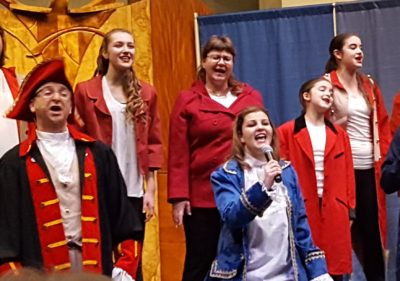BY CARY GINELL
His profession is as cantor of Temple Adat Elohim in Thousand Oaks. But David Shukiar is also a brilliant composer, arranger, conductor, choir director, and creator of Chamilton, a shpiel (Yiddish for “play”) based on songs from Lin-Manuel Miranda’s Broadway smash Hamilton. Shukiar adapted his show for the Jewish holiday of Purim. Chamilton (the “ch” is pronounced as in “chutzpah”) had two performances at TAE earlier this month and was a rousing success.
For the uninitiated, Purim is a Jewish holiday that commemorates the defeat of Haman’s plot to massacre the Jews, as recorded in the Book of Esther from the Old Testament. The holiday is sort of the Jewish equivalent of Halloween, in that congregants dress up as characters in the story. The custom of wearing costumes on Purim is an allusion to the nature of the Purim miracle, where the details of the story are really miracles hidden within natural events. We spoke with Shukiar in his office at TAE and talked about his creation, its purpose, and its intent.
VCOS: How long has putting a show like this been a theme for you at Purim?
DAVID: We’ve done it here, really, every year since I’ve been here. We have some talented people within the community and in the beginning, we used a series of three plays that were written by a temple member named David Ravetch which we did until a couple of years ago, but those were on a very small scale. Nothing was memorized, there were one or two rehearsals, the cast was usually temple staff, and we would do it just for the kids. It would be a little silly and fun. Last year, I upped the ante a little bit and I put together a Beatles’ shpiel, Shushan Schlepper’s Purim Chai Club Band. This was a little bit more rehearsed, the music was not just a piano, we had a band, we dressed like the Sgt. Pepper characters, we had a set, but we didn’t memorize it. But with that show, we raised the bar. For this year, I was thinking about what we should do next, and whether or not we would go back to one of David Ravetch’s plays. If it did, it would go through the religious school. But I’ve kind of taken it on now. I had this idea to do something with Hamilton. It’s the show everyone is talking about now and to be honest, I can’t think of a piece of theater that has crossed the line into pop culture this much, ever. You could argue that Rent did a little bit…
VCOS: And Les Mis…
DAVID: Yes, but not to this extent. Also Phantom. But everyone knows Hamilton. You show the logo and everyone knows exactly what it is. So last October, I started writing, just for fun, a show that I called Chamilton, A Purim Shpiel. I thought it really could be funny. Now don’t get me wrong. I’m not a hip-hop artist, I’m not a rapper, I don’t know anything about rap music, I listened to a little bit of Run D.M.C. when I was a kid, but not a lot. And so I didn’t think that I would have the chops to even attempt it.
VCOS: What is your background as a composer?
DAVID: I actually started out as a composer of musical theater. A couple of my things have been performed a few times, but I transitioned to writing Jewish music when I became choir director here at the synagogue and discovered a real love and passion for Jewish music. I’ve been fortunate in that, at the places that I’ve worked, I knew that any piece that I wrote I knew would be performed. It’s great for me because you can’t make a career as a composer of Jewish music. There’s no money in it. At all. But the fact that I have ways to get my stuff performed is pretty remarkable. So I have a musical theater background to begin with and I’ve also written pop songs, but never anything quite like this.
VCOS: Were you familiar with Hamilton when you started this?
DAVID: No. I had never listened to it before. I’d heard the “bum-bumpa-buh-bump-buh-bump” – I knew that part, but I knew nothing about the show. So I went to YouTube and I listened to the opening number. I remember noting that it had a pretty complex rhyme scheme but I thought I would try writing something like it. And I sat down – it was about 10:00 at night – and I wrote the opening number.
Haman: How does a peasant, orphan, living with her uncle or her cousin,
Dropped in the middle of a luxurious castle in Shushan,
Impoverished arriving as a zero,
Get chosen as our queen and is a hero?
Achash: Like no other, our queen mother without a mother,
She went undercover to become the King’s lover.
Only then did she discover the plot made by another.
As our Queen, she saved ev’ry Hebrew sister and brother.
Mordechai: Then Haman came and devastation reigned.
Our people saw their future drip dripping down the drain.
He created brand new laws that were meant to cause us pain.
He was using all his brain, driving all of us insane.
Haman: Well the word got around, Uncle Mordechai he came, and
Dressed like he’s in mourning he came to the castle gate, and
He said “Go see the King and remember don’t be afraid.
And the world’s gonna know your name, what’s your name, yo?”
Esther: My name is Esther Chamilton.
I said my name is Esther Chamilton.
I’ll make sure that Haman never wins,
Just you wait, just you wait.
DAVID: I kind of liked what I was coming up with, and I think a testament to it is the fact that I made only one lyric change as we produced the show. So I didn’t change any of the lyrics to it. So I wrote it that night, and then the next day, I did it for my wife, Leasa. She’s my first critic. And then I did it for my daughters, Carly and Hayley, and they said, “Wow! That’s really something!”
VCOS: Do your kids like rap or hip-hop?
DAVID: My daughters like everything but it’s not their style. But they love Hamilton. My wife will listen to anything as well and she liked Hamilton also, but we didn’t even own the cast album. We knew nothing about it. So I sent it to a couple of temple members who I knew loved Hamilton, the person who played Queen Esther, Alison Friedman, and her husband Bryan, who played King Achashverosh, and they thought it was fantastic, so I thought, “I’m gonna write another one.” The only other song I knew was “My Shot,” so I pulled that one up on YouTube and started looking at that and I wrote a song for Haman to sing about making people bow down. So that’s how it started. After that, I bought the cast album, I bought the vocal selections, and I started listening and studying the score. Man, do I have a new respect for Lin-Manuel Miranda. He is a Renaissance Man. He’s a genius. Then I started watching all the videos that I could on Hamilton. There’s not a lot of the show itself; they keep it very protected, but there is a lot of the behind-the-scenes stuff, and I watched every single one of them. I was just enthralled by the whole thing.
VCOS: What kind of secrets did you discover about writing in this idiom? When I saw In the Heights, and later, a staged reading of Hamilton, I realized that Miranda invented a new kind of recitative for musical theater. Instead of using dialogue, you can do that kind of exposition through rap.
DAVID: As someone who loves musical theater, you know that any good musical, no matter what genre it’s written in, has songs that advance the story. If you’re writing a show and your song doesn’t advance the story, then it’s not a musical, it’s a revue. In two hours and forty minutes, his musical tells an incredible story, and it’s an impressive thing to behold. The thing for me is that the kids know all the words. There are more words in Chamilton – I think its running time is around 45 minutes – than in most full-length Broadway musicals. The amount of words that are in Hamilton is astonishing. And the styles of rap that he uses for different characters are such that you see their progression through the way that they present the piece.
VCOS: I never noticed the differences in the styles for each character, can you talk about that?
DAVID: Look at a character like Lafayette. When you first see him, he can barely speak English. You know, “Oui, oui, mon ami, je m’appelle Lafayette,” it’s all very linear and easy. By the end of the first act, he does this thing where he’s rapping fast and he’s got double and triple rhymes in the middle of it, and you can see this character’s progression. You also see a different style of rap with George Washington that the other characters don’t have. So you can follow a character through each one’s own individual style. Then there’s Alexander Hamilton. Everyone else raps two or three lines but he goes on for a page because of his immense knowledge of the English language. It’s pretty amazing.
VCOS: How does this translate into the story of Purim?
DAVID: There are two schools of thought. One is that you take the story and you set it in a specific genre. With Shushan Schleppers, I stayed close the Beatles’ lyrics, then I took the story of Purim and stuck with it as closely as possible. There are other shpiels that were written where they would leave the story behind a little bit. At my old congregation, I wrote one with my rabbi called Harriet Potterstein and the Schlemiel Schmaltz, which told very loosely the Purim story. It had the characters, but it was more related to what happened in the first Harry Potter movie. At this temple, we try to stick pretty close to the story, because for us, this was our reading of the Megillah. We did not do a formal Megillah reading like we normally would do. So Chamilton was the reading of the Megillah. I think one of the comments that I’m most proud of from people who saw it was, “I have a new understanding of the Purim story because of the show.”
VCOS: As far as casting yourself in the show as Haman, the villain, what were your reasons for that?
DAVID: I’ve gotta tell you something. I fell in love with the rapping. I really did. Which is why there’s so much of it. In Hamilton there is a lot of rap, but there is also other stuff. But I included more rap in this one; in fact, half the show is not in the Hamilton vocal selections, I had to take it off the recording and notate everything. That’s a big task, but because I felt so strongly about the piece, I wanted to do it. But I think I picked Haman for me to play because I knew it so well. Having written it and knowing that Haman was the focus of the show, I knew that it would be easier for me to pull it off. I know every word of Chamilton backwards and forwards because I created it. I could even rap the entire show for you now, almost off the top of my head, because I spent so much time working on it.
VCOS: Is there a character in Hamilton where a lot of Haman’s material comes from?
DAVID: Probably the Aaron Burr character, but Haman also takes on a lot of the Alexander Hamilton stuff.
VCOS: So you’re basically using the songs and adapting them because the stories don’t really parallel one another.
DAVID: No, they don’t at all. It was me taking the songs and fitting them into our story. But I was also selective in the songs that I chose that would move the plot forward. A lot of times in the other Purim shpiels, you will have plot-plot-plot-plot-dialog, and then a song that talks about how they’re feeling. This show is not like that. The opening number tells you the entire story. And then through the succeeding songs, you find out the details of what’s happening in the story, not just the feelings about it. I don’t think there were any “stop-and-feel” songs. Every single one advances the plot.
VCOS: Considering the response you had to the show, it’s a shame to let Chamilton get put on the shelf. Are there any further plans for doing it again or maybe even publishing it?
DAVID: That’s a loaded question. In the short term, my guess is we’ll do this shpiel again next year. With Hamilton opening up in August at the Pantages, my guess is they’re going to extend it as long as they possible can and by this time next year, it might still be playing. Plus, there’s been enough of a buzz about this that people already are talking about wanting to see it again. We’ve never had that kind of a response before. So I’m thinking about remounting it, with a few small changes, but keep the bones the same. I’ve been approached by a lot of cantors and synagogues about wanting to rent it from me so they can do it. I flat out said no this year for two reasons. Number one is that I really wanted Adat Elohim to be the only one to do this particular shpiel. There are three other Hamilton shpiels out there, by the way. Two of them were packaged and sold.
VCOS: Do they need to be sanctioned by Miranda and his publisher? It could be categorized as satire, making it fair use, but that’s up for interpretation.
DAVID: I’m really not sure where this falls, to be honest.
VCOS: You cross the line when you start charging admission.
DAVID: I felt it would be crossing the line charging people to buy it from me. It’s Lin-Manuel Miranda’s show, even though I wrote it. But I have a certain stake in it as well.
VCOS: It could be argued that yours is an arrangement of the original.
DAVID: Yes, but the other reason why I didn’t want it done outside of here was that it wasn’t respecting the creator of the work to commercialize it. One of the things that we did differently than the other shpiels is that we had a five-piece band that performed the music live. We did not use anything pre-recorded. The band started rehearsing in December, long before the cast even saw it.
VCOS: Does this make you start thinking of other Broadway shows you might want to adapt?
DAVID: At my old temple, I wrote a Purim shpiel that was called Katz which consisted of take-offs on all different Broadway musicals. At that congregation, I was able to push the limits as to what was appropriate. If I were to present that shpiel here, I think I would not be welcomed back. I do think, however, that adapting Cats is something that we’ll do, because I think it’s a funny concept.
VCOS: You can have your own personal Forbidden Broadway.
DAVID: That’s basically what it is (laughs).






Kate Henderson
•7 years ago
I am not a member of the temple, but was invited to see the show by friends. All I can say is WOW. It was such fun! The cast was wonderful and it was so creative. I learned a lot, but with a huge grin on my face because it was hilarious. Thank you for the interview. I enjoyed learning more about the show’s creation.
Ellen Press
•7 years ago
Absolutely love the performance. We saw Hamilton and the performers at TAE nailed it.